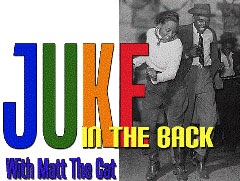
Juke In The Back » Podcast Feed
Matt The Cat
Matt The Cat presents the soul that came before rock and roll: 1950s rhythm and blues. Each week, this underrated and rollicking music plays on that old Rockola Jukebox in the back.
- 59 minutesEpisode #770 – Chess Records, Pt. 3 – 1952
Air Week: February 3-9, 2025
Chess Records, Pt. 3 – 1952
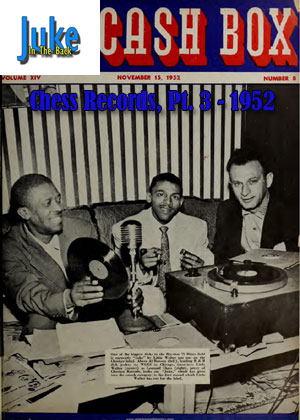
“Juke In The Back” continues a behemoth, multi-part series on Chess Records. The Chicago record label, founded by 2 Polish immigrant brothers, Leonard and Phil Chess, proved to be one of the most influential and important labels in not only Blues, but also Rhythm & Blues and its contribution to the birth of Rock n’ Roll. Chess was the musical home of Muddy Waters, Howlin’ Wolf, Little Walter, Chuck Berry, Bo Diddley, The Moonglows, The Flamingos and countless other giants of 20th Century music. In part 3, Matt The Cat focuses on the important Chess releases from 1952. The year was front-heavy with releases that Leonard Chess bought off of Sam Phillips in Memphis. Phillips was getting close to starting his own label, Sun Records, but at this time, Chess was his best customer for recordings from his roster of talent in Memphis. It began with Phillips’ early Ike Turner (Jackie Brenston), Howlin’ Wolf and Roscoe Gordon recordings, but soon blossomed into stellar offerings from Harmonica Frank, Rufus Thomas and Doctor Ross. In April of ’52, Chess launched its first subsidiary by introducing the Checker label. By the end of the year, Checker had its own star, Little Walter. Muddy’s old blues harp player was now sitting on top of the R&B charts with “Juke,” soon following up with “Sad Hours” b/w “Mean Old World.” Chess Records was really rollin’ in ’52 and on part 3 of our series, the “Juke” brings it all to you!
LISTEN BELOW
2 February 2025, 5:15 pm - 59 minutesEpisode #769 – Chess Records, Pt. 2 – 1950-51
Air Week: January 27-February 2, 2025
Chess Records, Pt. 2 – 1950-51
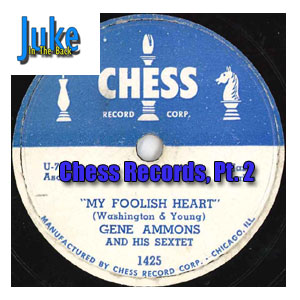
“Juke In The Back” continues a behemoth, multi-part series on Chess Records. The Chicago record label, founded by 2 Polish immigrant brothers, Leonard and Phil Chess, proved to be one of the most influential and important labels in not only Blues, but also Rhythm & Blues and its contribution to the birth of Rock n’ Roll. Chess was the musical home of Muddy Waters, Howlin’ Wolf, Little Walter, Chuck Berry, Bo Diddley, The Moonglows, The Flamingos and countless other giants of 20th Century music. In part 2, Matt The Cat focuses on the important Chess releases from 1950 and ’51. With Phil and Leonard together running the company, they would change Aristocrat Records to Chess in June, 1950. The brothers were short of cash to fund their fledgling label, but thanks to strong sellers from Gene Ammons, Al Hibbler and Jimmy Rogers, the label stayed afloat and scored its first R&B #1 with “Rocket 88.” This Ike Turner session that the brothers issued as by Jackie Brenston & His Delta Cats was recorded by Sam Phillips down at the Memphis Recording Service and purchased by Chess. Chess had a nice deal going with Phillips before he started his own label, Sun Records, in early ’52. They would also buy some demos and a contract with Howlin’ Wolf, which would pay dividends over the next 15 years. We’ll also hear the important releases from Muddy Waters during this time as we feature the 2nd part in our series on Chess Records on this week’s “Juke In The Back.”
LISTEN BELOW
26 January 2025, 5:00 pm - 59 minutesEpisode #768 – Chess Records, Pt. 1 – Aristocrat Records
Air Week: January 20-26, 2025
Chess Records, Pt. 1 – Aristocrat Records
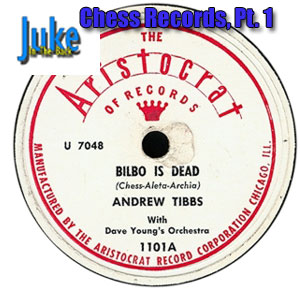
“Juke In The Back” begins a behemoth, multi-part series on Chess Records. The Chicago record label, founded by 2 Polish immigrant brothers, Leonard and Phil Chess, proved to be one of the most influential and important labels in not only Blues, but also Rhythm & Blues and its contribution to the birth of Rock n’ Roll. Chess was the musical home of Muddy Waters, Howlin’ Wolf, Little Walter, Chuck Berry, Bo Diddley, The Moonglows, The Flamingos and countless other giants of 20th Century music. In part 1, Matt The Cat introduces Leonard and Phil and their foray into the entertainment business, beginning with liquor clubs, nightclubs and eventually a record company. Leonard got a deep education of African-American culture while growing up, living and working on Chicago South Side. The jukebox in his liquor joint was jammed with the down-home Delta Blues that newly-arrived transplants from the South were craving. This set the stage for Leonard’s involvement with the fledgling Aristocrat Record Label. He originally bought into the label to help with distribution and promotion, but as the Blues became more popular, his involvement with the label grew. During the Aristocrat days, local talent from The 5 Blazes, Tom Archia and Andrew Tibbs was beginning to sell outside of Chicago. Tibbs’ song “Bilbo Is Dead” became a minor hit and was banned in parts of the South for its sarcastic tone towards recently deceased segregationist Senator Bilbo. Muddy Waters had only recently begun recording for the label, but in late 1948, he scored a national hit with “Feel Like Going Home” b/w “I Can’t Be Satisfied.” By the end of ’49, Leonard had bought out the other partners and brought in his brother Phil to help. Soon, Aristocrat would get a name-change to Chess and the brothers would be off and running. This week in part 1, we’ll look at where it all began on the Aristocrat of Records.
LISTEN BELOW
19 January 2025, 5:14 pm - 59 minutesEpisode #767 – Jimmy Reed: 1953-59
Air Week: January 13-19, 2025
Jimmy Reed: 1953-59

Jimmy Reed was a hit-making blues machine back in the 1950s, yet he isn’t as well remembered today as some of his contemporaries. This week, Matt The Cat and the “Juke In The Back” dedicate the entire program to this highly influential bluesman. Reed’s mid-tempo shuffle was unique when first introduced in 1953 and has since become a part of Blues and Rock n’ Roll DNA. Reed, along with The Spaniels, were the first two acts signed to Vivian Carter and James Bracken’s new label, Vee-Jay, out of Gary, Indiana. His first 2 releases didn’t go anywhere, but it was his third, “You Don’t Have To Go,” that put Reed into the R&B top 5. He’d score 19 charting singles over the next 13 years. Some of them, like “Can’t Stand To See You Go,” “Little Rain,” “Honest I Do,” “Take Out Some Insurance,” “Baby What You Want Me To Do,” “Big Boss Man” and “Bright Lights, Big City” have become blues standards. Almost anyone could sing and play a Jimmy Reed tune, but only one man sounded like Jimmy Reed. This week, Matt The Cat loads up the “Juke In The Back” with Reed’s finest sides from 1953-59.
LISTEN BELOW
12 January 2025, 5:48 pm - 59 minutesEpisode #766 – 1955: Jukebox Rhythm Review, Pt. 2
Air Week: January 6-12, 2025
1955: Jukebox Rhythm Review, Pt. 2
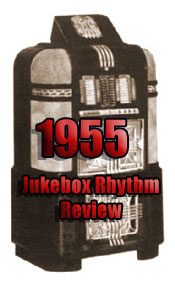
Let’s journey back 70 years and put the ol’ Rockola Jukebox back in the spotlight as we present part 2 of a 2 part feature on the biggest R&B jukebox records of 1955. It was a year of many firsts. 1955 was the first full year of Rhythm & Blues records consistently crossing over into the Pop Chart. Matt The Cat will point out just how popular some of these records were in the Pop Market. 1955 was also the debut year for Bo Diddley, Chuck Berry and Etta James. Fats Domino had 6 charting singles this year, 3 of which topped the R&B chart. 1955 was the year of “Blackboard Jungle”‘s tremendous success in helping to deliver Rock n’ Roll music to the mainstream through the popularity of its theme song, “(We’re Gonna) Rock Around The Clock.” In Part 2, we’ll spin the last R&B chart-topper to NOT cross over into the Pop Chart as well as a healthy dose of vocal group records gaining jukebox spins. Smiley Lews, The Clovers and The Drifters, with a new lead singer, continued to score hits and make 1955 a year to remember. Part 2 covers the jukebox hits from July through December.
LISTEN BELOW
5 January 2025, 5:42 pm - 59 minutesEpisode #765 – 1955: Jukebox Rhythm Review, Pt. 1
Air Week: December 30, 2024-January 5, 2025
1955: Jukebox Rhythm Review, Pt. 1

Let’s journey back 70 years and put the ol’ Rockola Jukebox back in the spotlight as we present part 1 of a 2 part feature on the biggest R&B jukebox records of 1955. It was a year of many firsts. 1955 was the first full year of Rhythm & Blues records consistently crossing over into the Pop Chart. Matt The Cat will point out just how popular some of these records were in the Pop Market. 1955 was also the debut year for Bo Diddley, Chuck Berry and Etta James. It was the last year for Johnny Ace, who scored the biggest hit of his career, posthumously. 1955 was the year of “Blackboard Jungle”‘s tremendous success in helping to deliver Rock n’ Roll music to the mainstream through the popularity of its theme song, “(We’re Gonna) Rock Around The Clock.” In Part 1, we’ll look at just how big a record “Unchained Melody” was, with 2 versions topping the R&B Chart and crossing over to the Pop Top 10. Little Walter, Ray Charles and Ruth Brown continued to score hits and make 1955 a year to remember. Part 1 covers the jukebox hits from January to June and Part 2 will focus on July through December.
LISTEN BELOW
29 December 2024, 4:22 pm - 59 minutesEpisode #764 – 1945: Jukebox Rhythm Review
Air Week: December 23-29, 2024
1945: Jukebox Rhythm Review
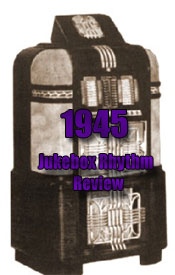
This week, the “Juke In The Back” brings the jukebox into the spotlight as we journey back 80 years and dig on the top requested jukebox records from the entire year of 1945. This was a pivotal year for Rhythm and Blues Music as 1945 marked the beginning of a new sound in Black Music. As the war raged on, many of the African-American big bands found it hard to afford such large ensembles, so they slimmed down to rhythm combos. Around the same time, blues singers were expanding their sound to go beyond just a guitar or piano accompaniment. They began adding rhythm sections and thus, Rhythm and Blues was born. 1945 marked the first year that this new style of music dominated the Black Community and the juke joints they patronized. 1945 was a strong year for jump blues cats like Louis Jordan, Joe Turner and Lionel Hampton. The blues cats faired well this year as Pvt. Cecil Gant had one of the year’s biggest hits with his self-penned, “I Wonder,” which was also successfully covered by Roosevelt Sykes and Louis Armstrong. Joe Liggins burst on the scene with “The Honeydripper,” the biggest selling record of the year and quite possibly the entire decade! Matt The Cat’s got a pocket full of nickels and he’s ready to warm up the “Juke In The Back,” so we can all dig that big beat jive of 1945!
LISTEN BELOW
22 December 2024, 4:49 pm - 1 minuteJuke In The Back Promo
1940s & â€
 50s Rhythm & Blues
50s Rhythm & Blues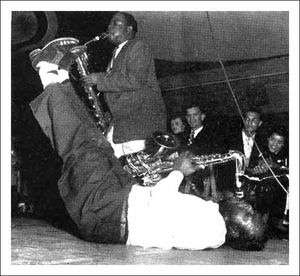
At the end of the Second World War, economics forced the big bands to trim their once great size and thus, the Jump Blues combo was born. Between 1946-1954, rhythm and blues laid the tracks for what was to become Rock nâ€
 Roll. So how come, 70 years later, this vibrant and influential music is still so unknown to so many?
Roll. So how come, 70 years later, this vibrant and influential music is still so unknown to so many?Matt The Cat is going to change that with the radio program, “Juke In The Back.†These were the records that you couldnâ€
 t hear on the jukebox in the front of the establishment. To hear all this great 1950s rhythm & blues, you had to go to “Juke In The Back.â€28 July 2020, 1:03 am
t hear on the jukebox in the front of the establishment. To hear all this great 1950s rhythm & blues, you had to go to “Juke In The Back.â€28 July 2020, 1:03 am - More Episodes? Get the App
Your feedback is valuable to us. Should you encounter any bugs, glitches, lack of functionality or other problems, please email us on [email protected] or join Moon.FM Telegram Group where you can talk directly to the dev team who are happy to answer any queries.
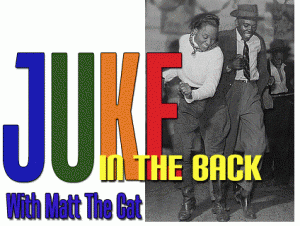
 Rapidly Rotating Records
Rapidly Rotating Records
 Pete D's Attic Of Hits
Pete D's Attic Of Hits
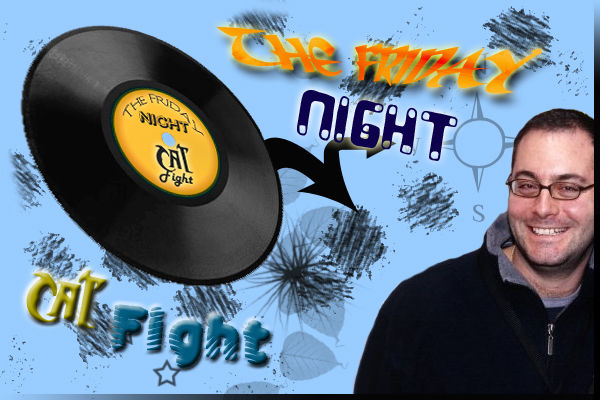 Friday Night Cat Fight » Podcast Feed
Friday Night Cat Fight » Podcast Feed
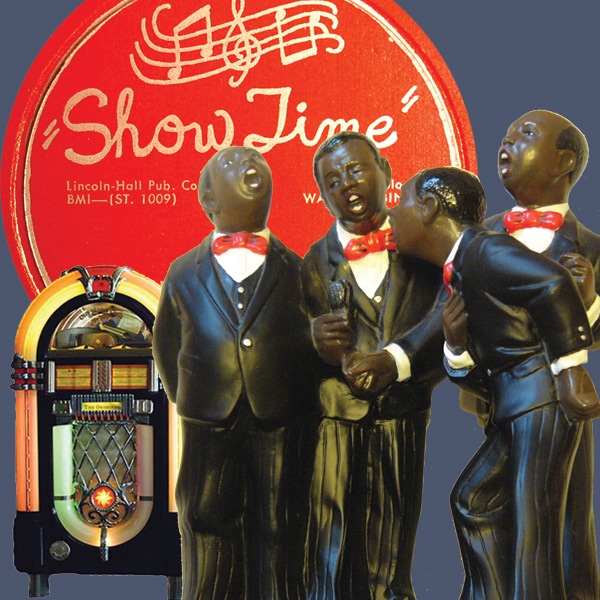 Color Radio
Color Radio
 Easy Ed's Variety Hour
Easy Ed's Variety Hour
 The Shellac Stack
The Shellac Stack